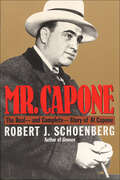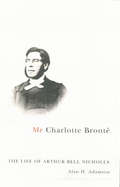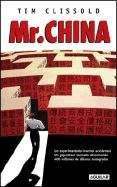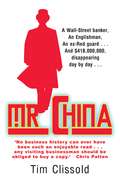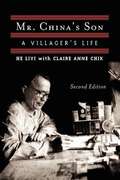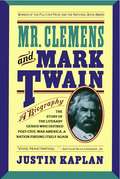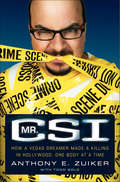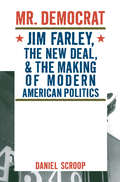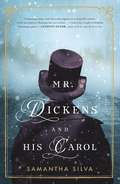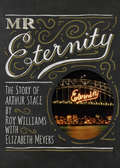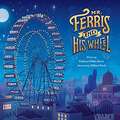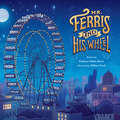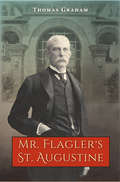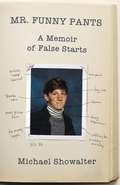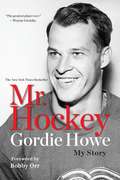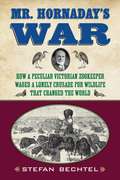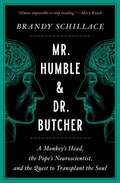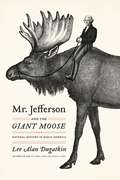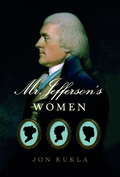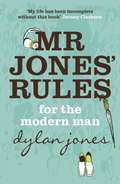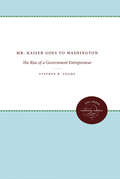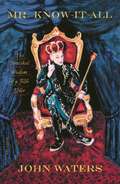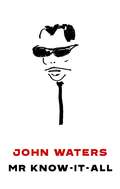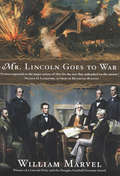- Table View
- List View
Mr. Capone: The Real—and Complete—Story of Al Capone
by Robert J. SchoenbergAll I ever did was to sell beer and whiskey to our best people. All I ever did was to supply a demand that was pretty popular. Why, the very guys that make my trade good are the ones that yell the loudest about me. Some of the leading judges use the stuff. When I sell liquor, it's called bootlegging. When my patrons serve it on silver trays on Lake Shore Drive, it's called hospitality.-- Al Capone
Mr Charlotte Brontë: The Life of Arthur Bell Nicholls
by Alan H. AdamsonAlan Adamson's biography takes recent scholarship into account and adds new material about Nicholl's family, education, and early life in Ireland to give a more balanced view. The book explores why Brontë, cool and often hostile towards Nicholls in the early days of his curacy at Haworth, came to respect and love him, and how Patrick Brontë, her difficult father, grew to rely on him after her death.
Mr. China
by Tim ClissoldLa increíble historia de un banquero de Wall Street que viaja a China con cuatrocientos millones de dólares y aprende, de la manera más dura, que ese país no juega con las mismas reglas de Occidente. A principios de los noventa, cuando China abrió finalmente sus puertas a los negocios, Wall Street de inmediato quiso entrar. La llegada de los banqueros de Nueva York, con sus especializaciones en Harvard, sus camisas de rayas y sus mocasines con borlas, listos para negociar con los viejos amos chinos, crea el escenario perfecto para un choque entre los billones de Wall Street y la cultura más antigua del mundo. Tomada de la vida real, ésta es la historia de un recio banquero que se traslada a China buscando la gloria. Decidido a montarse en la gran ola de la inversión, se une con un ex guardia rojo y un inglés que habla mandarín. Entre los tres consiguen cuatrocientos millones de dólares y compran fábricas por todo el país. Pero cuando creen que con los contratos que han firmado tienen todo bajo control, comienzan a darse cuenta de que en China las cosas no funcionan de la manera que ellos conocen y son testigos de cómo desaparecen sus millones. "Ésta es una historia increíble... bien escrita, que absorbe completamente la atención y es muy divertida." Literary Review "Todas las compañías que tienen sede en China deberían armar a sus ejecutivos con una copia de esta sorprendente, divertida y culturalmente comprensiva historia de los peligros de hacer negocios en el salvaje oeste asiático". "Los libros del año" de The Economist
Mr. China
by Tim ClissoldThe incredible story of a Wall Street banker who went to China with $400,000,000 and learned the hard way how (not) to do business there . . . In the early nineties, China finally opened for business and Wall Street wanted in on the act. When the investment bankers arrived from New York with their Harvard MBAs, pinstripes and tasselled loafers, ready to negotiate with the Old Cadres, the stage was set for collision. This is the true story of a tough Wall Street banker who came to China looking for glory. He teamed up with an ex-Red Guard and a Mandarin-speaking Englishman. Together, they raised over $400,000,000 and bought up factories all over China. Only as they watched those millions slide towards the abyss did they start to understand that China really doesn't play by anyone else's rules. Tim Clissold was there at the beginning of China's transformation and he's still there, doing business. In this new edition of his hugely successful book he describes just how much - and how little - has changed in China since his story began.
Mr. China's Son
by Claire Chik He LiyiHe Liyi's autobiography recounts nearly all the major events of China's recent history, including the Japanese occupation, and the recent social and economic changes occurring in the post-Deng China.
Mr. Clemens and Mark Twain: A Biography
by Justin KaplanMark Twain, the American comic genius who portrayed, named, and in part exemplified America's "Gilded Age," comes alive -- a presence felt, an artist understood -- in Justin Kaplan's extraordinary biography. <P><P> With brilliant immediacy, Mr. Clemens and Mark Twain brings to life a towering literary figure whose dual persona symbolized the emerging American conflict between down-to-earth morality and freewheeling ambition. As Mark Twain, he was the Mississippi riverboat pilot, the satirist with a fiery hatred of pretension, and the author of such classics as Tom Sawyer and Huckleberry Finn. As Mr. Clemens, he was the star who married an heiress, built a palatial estate, threw away fortunes on harebrained financial schemes, and lived the extravagant life that Mark Twain despised. Kaplan effectively portrays the triumphant-tragic man whose achievements and failures, laughter and anger, reflect a crucial generation in our past as well as his own dark, divided, and remarkably contemporary spirit. <P> The book begins as the thirty-one-year-old Mark Twain, carrying bottled within himself the experience of his boyhood in Hannibal and his coming-of-age on the Mississippi and on Nevada's silver-rush frontier, quits San Francisco and the old elemental America of the open spaces. He is heading east for the burgeoning new urban America of commerce, invention, finance, and status, where he is destined to marry well, hobnob with the rich and influential, throw away fortunes on tragically alluring schemes...and produce literary works that fulfill and go beyond the vocation he has already acknowledged: "to excite the laughter of God's creatures." He is heard, seen, made palpable. The texture of his marriage with Olivia Langdon, the protean presence of Mark Twain on the lecture platform, his friendships and enmities -- virtually all his closest relationships partook of both -- spring to life. His writing and publishing experience is organically re-created. His endurance in the face of personal tragedy, his unrivaled charm, his compulsion to quarrel, his humility and his vanity are evoked and felt. His wit rings through the book. "Honest poverty is a gem that even a King might be proud to call his own, but I wish to sell out. I have sported that kind of jewelry long enough." Thus the young Mark Twain, on the eve of world fame, spoke his disgust at a money-centered society in that blatantly philistine voice that he chose for his most savage satirical declarations. But all his life -- racked by his own ambivalences -- he was to embrace the values of that society. Mr. Clemens and Mark Twain brilliantly conveys this towering literary figure who was himself a symbol of the peculiarly American conflict between moral scrutiny and the drive to succeed. Mr. Clemens lived the Gilded Life that Mark Twain despised. The merging and fragmenting of these and other identities, as the biography unfolds, results in a magnificent projection of the whole man; the great comic spirit; and the exuberant, tragic human being, who, his friend William Dean Howells said, was "sole, incomparable, the Lincoln of our literature."<P> Winner of the National Book Award<P> Pulitzer Prize Winner
Mr. CSI
by Todd Gold Anthony E. ZuikerIn 1990, Anthony Zuiker was just another Hollywood wannabe-a balding, overweight guy driving a tram in Las Vegas for eight bucks an hour, telling his friends about the screenplay he was writing, dreaming of fame. He'd grown up in Vegas, where his mother worked the blackjack table at a casino, while his father flitted back and forth from investment schemes that didn't seem to go anywhere. His friends figured Anthony wouldn't either. But twenty years later, Zuiker stands as the mastermind behind the most popular television show in history, CSI: Crime Scene Investigation, and its spin-offs: CSI: Miami and CSI: NY. How he got there-a remarkable rise from nothing to something-is the narrative lifeblood of Mr. CSI, only, like the show itself, there's a catch: On a January morning in 2005, Zuiker got a call from the Las Vegas Police Department while he was working at his desk on a script for CSI: NY. His estranged father, whom Zuiker hadn't seen for a decade, had put a shotgun in his mouth and pulled the trigger. So begins Mr. CSI, a book that frames Zuiker's astonishing ascendency to fame and fortune with an unsettling and honest appraisal of his father's suicide. It's a book that uses the conventions that have made CSI a worldwide success to tell a far more personal story, of what one man left behind in his success and what he gained when he returned.
Mr. Democrat: Jim Farley, the New Deal and the Making of Modern American Politics
by Daniel ScroopScroop (history, U. of Liverpool) takes on the background of this most powerful and neglected man, detailing the growth of Farley's perception that politics is a noble profession requiring the support and acumen of business. Scroop makes it clear that Franklin Delano Roosevelt's choice of Farley as his campaign manager was well-reasoned and that although Farley made mistakes, more mistakes were made about him by those who feared his motives and abilities just as they feared every other architect of the New Deal. Annotation ©2006 Book News, Inc. , Portland, OR (booknews. com)
Mr. Dickens and His Carol: A Novel
by Samantha Silva“A charming, comic, and ultimately poignant story about the creation of the most famous Christmas tale ever written. It’s as foggy and haunted and redemptive as the original; it’s all heart, and I read it in a couple of ebullient, Christmassy gulps.” —Anthony Doerr, #1 New York Times bestselling author of All The Light We Cannot SeeLaced with humor, rich historical detail from Charles Dickens’ life, and clever winks to his work, Samantha Silva's Mr. Dickens and His Carol is an irresistible new take on a cherished classic. Charles Dickens is not feeling the Christmas spirit. His newest book is an utter flop, the critics have turned against him, relatives near and far hound him for money. While his wife plans a lavish holiday party for their ever-expanding family and circle of friends, Dickens has visions of the poor house. But when his publishers try to blackmail him into writing a Christmas book to save them all from financial ruin, he refuses. And a serious bout of writer’s block sets in. Frazzled and filled with self-doubt, Dickens seeks solace in his great palace of thinking, the city of London itself. On one of his long night walks, in a once-beloved square, he meets the mysterious Eleanor Lovejoy, who might be just the muse he needs. As Dickens’ deadlines close in, Eleanor propels him on a Scrooge-like journey that tests everything he believes about generosity, friendship, ambition, and love. The story he writes will change Christmas forever.
Mr Eternity: The Story of Arthur Stace
by Roy Williams Elizabeth MeyersAlmost every day for 35 years, Arthur Stace spent hours writing a single word – Eternity – on and around the streets of Sydney. Sometimes his mission took him much further afield, to country New South Wales and even to Melbourne.Stace’s identity was a mystery for more than two decades. Then, after his ‘unmasking’ in 1956, he became a reluctant folk hero. By the time he died, in 1967, his was a household name and the word Eternity was ingrained in the soul of Sydney. It still is.In this long-awaited biography, the full story of Arthur Stace’s life is told for the first time in vivid and often surprising detail. Drawing upon many original sources, some never before made public, this book will engross Christians and non-believers alike – anyone who loves a great Australian story.
Mr. Ferris and His Wheel (Into Reading, Trade Book #5)
by Kathryn Davis Gilbert FordNIMAC-sourced textbook
Mr. Ferris and His Wheel
by Gilbert Ford Kathryn Gibbs DavisCapturing an engineer's creative vision and mind for detail, this fully illustrated picture book biography sheds light on how the American inventor George Ferris defied gravity and seemingly impossible odds to invent the world's most iconic amusement park attraction, the Ferris wheel. A fun, fact-filled text by Kathryn Gibbs Davis combines with Gilbert Ford's dazzling full-color illustrations to transport readers to the 1893 World's Fair, where George Ferris and his big, wonderful wheel lifted passengers to the skies for the first time.
Mr. Flagler's St. Augustine
by Thomas GrahamArguably no man did more to make over a city—or a state—than Henry Morrison Flagler. Almost single-handedly, he transformed the east coast of Florida from a remote frontier into the winter playground of America’s elite.Mr. Flagler’s St. Augustine tells the story of how one of the wealthiest men in America spared no expense in transforming the country’s “Oldest City” into the “Newport of the South.” He built railroads into remote areas where men feared to tread and erected palatial hotels on swampland. He funded hospitals and churches and improved streets and parks. The rich and famous flocked to his invented paradise.In tracing Flagler’s life and second career, Thomas Graham reveals much about the inner life of the former oil magnate and the demons that drove him to expand a coastal empire southward to Palm Beach, Miami, Key West, and finally Nassau. Graham also gives voice to the individuals history has forgotten: the women who wrote tourist books, the artists who decorated the hotels, the black servants who waited tables, and the journalists who filed society columns in the newspapers.Filled with fascinating details that bring the Gilded Age to life, this book will stand as the definitive history of Henry Flagler and his time in Florida.
Mr. Funny Pants
by Michael ShowalterI was at my wit's end. I'd had enough of this job, this life, and my relationship had broken up. Should I eat chocolate, or go to India, or fall in love? Then I had a revelation: Why not do all three, in that order? And so it was that I embarked on a journey that was segmented into three parts and was then made into a major motion picture. Later, I woke up on an airplane with a hole in my face and a really bad hangover. I was ushered brusquely off the plane by my parents who took me to a rehab where I tested positive for coke, classic coke, special k (the drug), Special K (the cereal), mushrooms, pepperoni, and Restless Leg Syndrome. It was there that I first began painting with my feet.But rewind...the year was 1914. I was just a young German soldier serving in the trenches while simultaneously trying to destroy an evil ring with some help from an elf, a troll, and a giant sorcerer, all while cooking every recipe out of a Julia Child cookbook. What I'm trying to say is that there was a secret code hidden in a painting and I was looking for it with this girl who had a tattoo of a dragon! Let me clarify, it was the 1930s and a bunch of us were migrating out of Oklahoma, and I was this teenage wizard/CIA operative, okay? And, um then I floated off into the meta-verse as a ball of invisible energy that had no outer edge...Ugh, okay. None of this is true. I'm just kind of a normal guy from New Jersey who moved to New York, got into comedy, wrote this book about trying to write this book, and then moved to Alaska, became the mayor of a small town, spent $30,000 on underwear, and now I'm going to rule the world!!!
Mr. Hockey: My Story
by Gordie HoweThe definitive autobiography from hockey's greatest living legend--"Mr. Hockey" himself, Gordie Howe. Big, skilled, tough on the ice, and nearly indestructible, Howe dominated both the sport and the record books like no one has before or since. <P><P>Over an incredible six decades, the Hall of Famer had so many accomplishments that he set the record for the most records by any athlete ever in any sport. He also achieved the remarkable feat of playing for six years with his own two sons, Mark and Marty. But Howe did not inspire generations of hockey players simply by rewriting the record books. When people talk about him, it's the man they revere even more than the player. Despite his ferocity on the ice, Howe's name has long been a byword for decency and generosity. <P>A family man, a man of his word, a lifelong ambassador for the game, he is a true icon, and now he takes us through it all, from his Depression-era childhood and early obstacles through the ups and downs of his spectacular career, to his enduring marriage and close relationship with his children, to his thoughts on the game of hockey today. There has never been a comprehensive account of Howe's life from the man himself. Now is the time.
Mr. Hornaday's War: How a Peculiar Victorian Zookeeper Waged a Lonely Crusade for Wildlife That Changed the World
by Stefan BechtelHe was complex, quirky, pugnacious, and difficult. He seemed to create enemies wherever he went, even among his friends. A fireplug of a man who stood only five feet eight inches in his stocking feet, he had an outsized ambition to make his mark on the world. And he did. William Temple Hornaday (1854-1937) was probably the most famous conservationist of the nineteenth century, second only to his great friend and ally Theodore Roosevelt. Hornaday's great passion was protecting wild things and wild places, and he spent most of his adult life in a state of war on their behalf, as a taxidermist and museum collector; as the founder and first director of the National Zoo in Washington, DC; as director of the Bronx Zoo for thirty years; and as the author of nearly two dozen books on conservation and wildlife. But in Mr. Hornaday's War, the long-overdue biography of Hornaday by journalist Stefan Bechtel, the grinding contradictions of Hornaday's life also become clear. Though he is credited with saving the American bison from extinction, he began his career as a rifleman and trophy hunter who led "the last buffalo hunt" into the Montana Territory. And what happened in 1906 at the Bronx Zoo, when Hornaday displayed an African man in a cage, shows a side of him that is as baffling as it is repellent. This gripping new book takes an honest look at a fascinating and enigmatic man.
Mr. Humble & Dr. Butcher: A Monkey's Head, the Pope's Neuroscientist, and the Quest to Transplant the Soul
by Brandy SchillaceThe &“delightfully macabre&” (The New York Times) true tale of a brilliant and eccentric surgeon…and his quest to transplant the human soul.In the early days of the Cold War, a spirit of desperate scientific rivalry birthed a different kind of space race: not the race to outer space that we all know, but a race to master the inner space of the human body. While surgeons on either side of the Iron Curtain competed to become the first to transplant organs like the kidney and heart, a young American neurosurgeon had an even more ambitious thought: Why not transplant the brain?Dr. Robert White was a friend to two popes and a founder of the Vatican&’s Commission on Bioethics. He developed lifesaving neurosurgical techniques still used in hospitals today and was nominated for the Nobel Prize. But like Dr. Jekyll before him, Dr. White had another identity. In his lab, he was waging a battle against the limits of science and against mortality itself—working to perfect a surgery that would allow the soul to live on after the human body had died.This &“fascinating&” (The Wall Street Journal), &“provocative&” (The Washington Post) tale follows his decades-long quest into tangled matters of science, Cold War politics, and faith, revealing the complex (and often murky) ethics of experimentation and remarkable innovations that today save patients from certain death. It&’s a &“masterful&” (Science) look at our greatest fears and our greatest hopes—and the long, strange journey from science fiction to science fact.
Mr. Jefferson and the Giant Moose: Natural History in Early America
by Lee Alan DugatkinIn the years after the Revolutionary War, the fledgling republic of America was viewed by many Europeans as a degenerate backwater, populated by subspecies weak and feeble. Chief among these naysayers was the French Count and world-renowned naturalist Georges-Louis Leclerc de Buffon, who wrote that the flora and fauna of America (humans included) were inferior to European specimens. Thomas Jefferson--author of the Declaration of Independence, U. S. president, and ardent naturalist--spent years countering the French conception of American degeneracy. His Notes on Virginia systematically and scientifically dismantled Buffon's case through a series of tables and equally compelling writing on the nature of his home state. But the book did little to counter the arrogance of the French and hardly satisfied Jefferson's quest to demonstrate that his young nation was every bit the equal of a well-established Europe. Enter the giant moose. The American moose, which Jefferson claimed was so enormous a European reindeer could walk under it, became the cornerstone of his defense. Convinced that the sight of such a magnificent beast would cause Buffon to revise his claims, Jefferson had the remains of a seven-foot ungulate shipped first class from New Hampshire to Paris. Unfortunately, Buffon died before he could make any revisions to his Histoire Naturelle,but the legend of the moose makes for a fascinating tale about Jefferson's passion to prove that American nature deserved prestige. In Mr. Jefferson and the Giant Moose,Lee Alan Dugatkin vividly recreates the origin and evolution of the debates about natural history in America and, in so doing, returns the prize moose to its rightful place in American history.
Mr. Jefferson's Women
by Jon KuklaThis work examines Thomas Jefferson's personal relationships with women over the course of his life, from his spurned proposal to Rebecca Burwell to his relationship with his slave Sally Hemings, the half-sister of his dead wife. The picture that emerges is hardly flattering to the third president of the United States, who is portrayed as having harbored a life-long fear of women that reinforced his views that women should be limited in their participation in public life and that there should be no relaxation of women's subordination in law, culture, and education--views that are argued to have had long-lasting effects on American society. Annotation ©2008 Book News, Inc. , Portland, OR (booknews. com)
Mr Jones' Rules for the Modern Man
by Dylan JonesA witty, stylish and indispensable guide to being a modern man. It is tough being a man in the twenty-first century. First there are the big dilemmas, like how to get a pay rise and how to suck up to your boss. Then there are the minor irritations: how do you beat jet-lag, and how do you stop your trousers sliding off their hangers? And finally there are all those things you ought to know, but don't: how to jump-start a car, how to buy lingerie, how to stop smoking, how to tie a Windsor Knot, how to behave at a lap-dancing club ... the list is endless. Fear not. In Mr Jones Rules, the highly respected editor of GQ magazine, draws on his wealth of experience to give the final answer to these questions and more. It will be the must-have present for every husband, boyfriend and son this Christmas.
Mr Jones' Rules for the Modern Man
by Dylan JonesA witty, stylish and indispensable guide to being a modern man. It is tough being a man in the twenty-first century. First there are the big dilemmas, like how to get a pay rise and how to suck up to your boss. Then there are the minor irritations: how do you beat jet-lag, and how do you stop your trousers sliding off their hangers? And finally there are all those things you ought to know, but don't: how to jump-start a car, how to buy lingerie, how to stop smoking, how to tie a Windsor Knot, how to behave at a lap-dancing club ... the list is endless. Fear not. In Mr Jones Rules, the highly respected editor of GQ magazine, draws on his wealth of experience to give the final answer to these questions and more. It will be the must-have present for every husband, boyfriend and son this Christmas.
Mr. Kaiser Goes to Washington: The Rise of a Government Entrepreneur (The Luther H. Hodges Jr. and Luther H. Hodges Sr. Series on Business, Entrepreneurship, and Public Policy #No. 2)
by Stephen B. AdamsIn the 1940s, the name Henry J. Kaiser was magic. Based on the success of his shipyards, Kaiser was hailed by the national media as the force behind a 'can-do' production miracle and credited by the American public with doing more to help President Roosevelt win World War II than any other civilian. Kaiser also built an empire in construction, cement, magnesium, steel, and aluminum--all based on government contracts, government loans, and changes in government regulations. In this book, Stephen Adams offers Kaiser's story as the first detailed case study of 'government entrepreneurship.' Taking a fresh look at the birth of modern business-government relations, he explores the symbiotic connection forged between FDR and Kaiser. Adams shows that while Kaiser capitalized on opportunities provided by the growth of the federal government, FDR found in Kaiser an industrial partner whose enterprises embodied New Deal goals. The result of a confluence of administration policy and entrepreneurial zeal, Kaiser's dramatic rise illustrates the important role of governmental relations in American entrepreneurial success.Originally published in 1997.A UNC Press Enduring Edition -- UNC Press Enduring Editions use the latest in digital technology to make available again books from our distinguished backlist that were previously out of print. These editions are published unaltered from the original, and are presented in affordable paperback formats, bringing readers both historical and cultural value.
Mr. Know-It-All: The Tarnished Wisdom of a Filth Elder
by John WatersNo one knows more about everything—especially everything rude, clever, and offensively compelling—than John Waters. The man in the pencil-thin mustache, auteur of the transgressive movie classics Pink Flamingos, Polyester, the original Hairspray, Cry-Baby, and A Dirty Shame, is one of the world’s great sophisticates, and in Mr. Know-It-All he serves it up raw: how to fail upward in Hollywood; how to develop musical taste from Nervous Norvus to Maria Callas; how to build a home so ugly and trendy that no one but you would dare live in it; more important, how to tell someone you love them without emotional risk; and yes, how to cheat death itself. Through it all, Waters swears by one undeniable truth: “Whatever you might have heard, there is absolutely no downside to being famous. None at all.” <P><P>Studded with cameos of Waters’s stars, from Divine and Mink Stole to Johnny Depp, Kathleen Turner, Patricia Hearst, and Tracey Ullman, and illustrated with unseen photos from Waters’s personal collection, Mr. Know-It-All is Waters’s most hypnotically readable, upsetting, revelatory book—another instant Waters classic.
Mr Know-It-All: The Tarnished Wisdom of a Filth Elder
by John WatersNo one knows more about everything - especially everything rude, clever, and offensively compelling - than John Waters. The man in the pencil-thin mustache, auteur of the transgressive movie classics Pink Flamingos, Polyester, the original Hairspray, Cry-Baby, and A Dirty Shame, is one of the world's great sophisticates, and in Mr. Know-It-All he serves it up raw: how to fail upward in Hollywood; how to develop musical taste from Nervous Norvus to Maria Callas; how to build a home so ugly and trendy that no one but you would dare live in it; more important, how to tell someone you love them without emotional risk; and yes, how to cheat death itself. Through it all, Waters swears by one undeniable truth: "Whatever you might have heard, there is absolutely no downside to being famous. None at all."Studded with cameos of Waters's stars, from Divine and Mink Stole to Johnny Depp, Kathleen Turner, Patricia Hearst, and Tracey Ullman, and illustrated with unseen photos from Waters's personal collection, Mr. Know-It-All is Waters's most hypnotically readable, upsetting, revelatory book - another instant Waters classic.'Waters doesn't kowtow to the received wisdom, he flips it the bird . . . [Waters] has the ability to show humanity at its most ridiculous and make that funny rather than repellent' Jonathan Yardley, The Washington Post'Carsick becomes a portrait not just of America's desolate freeway nodes - though they're brilliantly evoked - but of American fame itself' Lawrence Osborne, The New York Times Book Review
Mr. Lincoln Goes to War
by William MarvelAn account of how America&’s greatest crisis began, by &“the Civil War&’s master historical detective&” (Stephen W. Sears, author of Chancellorsville). This groundbreaking book investigates the mystery of how the Civil War began, reconsidering the big question: Was it inevitable? The award-winning author of Andersonville and Lincoln&’s Autocrat vividly recreates President Abraham Lincoln&’s first year in office, from his inauguration through the rising crisis of secession and the first several months of the war. Drawing on original sources and examining previously overlooked factors, he leads the reader inexorably to the conclusion that Lincoln not only missed opportunities to avoid war but actually fanned the flames—and often acted unconstitutionally in prosecuting the war once it had begun. With a keen eye for the telling detail, on the battlefield as well as in the White House, this is revisionist history at its best, not sparing anyone, even Abraham Lincoln. &“A brilliant narrative that reveals the possibilities of the past that were squandered by historical figures who seem so unassailable and godlike to us today.&” —Peter S. Carmichael, author of The Last Generation &“The most provocative account of events in 1861 in a generation. Readers who think they understand the Civil War&’s first year and the roles played by Abraham Lincoln, Nathanial Lyon, Charles Stone, and a host of others should brace themselves for a bold new perspective.&” —A. Wilson Greene, author of Breaking the Backbone of the Rebellion
